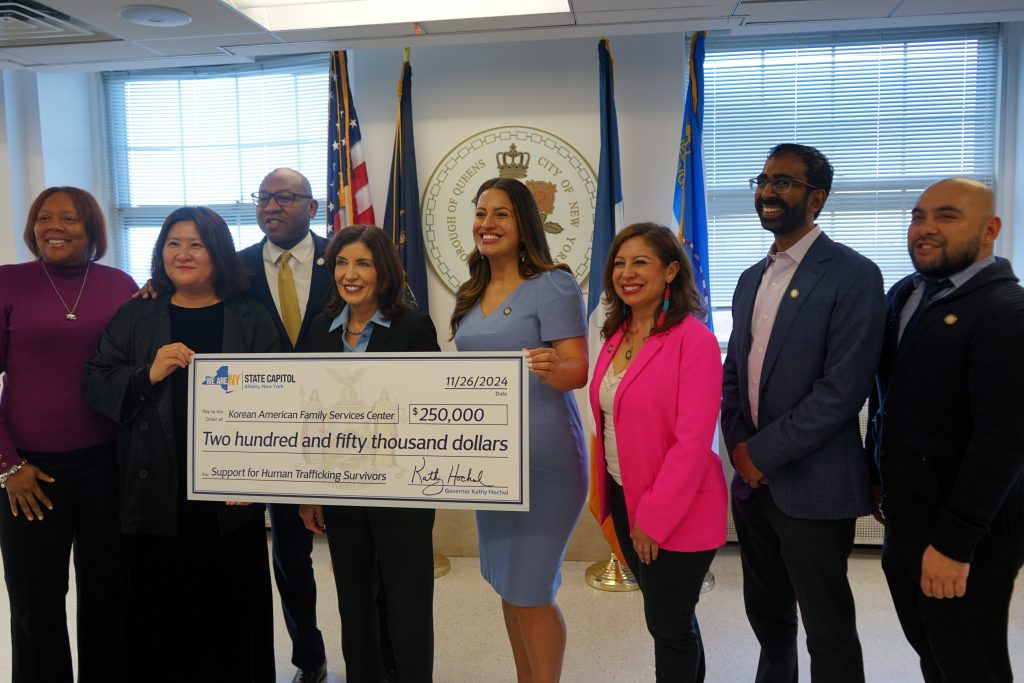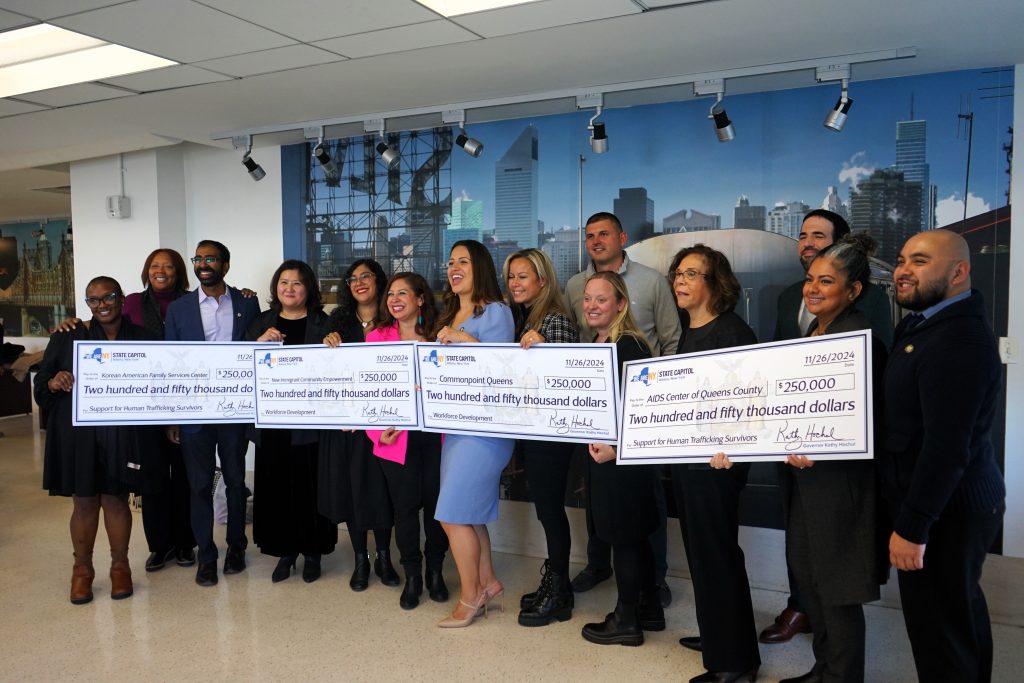
Courtesy office of Jessica González-Rojas
Governor Kathy Hochul announced $1 million in funding for four local nonprofits to address crime, human trafficking, and workforce challenges on Roosevelt Avenue in Queens.
By MOHAMED FARGHALY
mfarghaly@queensledger.com
In a coordinated effort to address growing concerns over illegal activities, human trafficking, and crime on Roosevelt Avenue in Queens, Governor Kathy Hochul, local lawmakers, and community organizations have joined forces to support vulnerable residents with new funding. At an event held at Queens Borough Hall, Governor Hochul announced the allocation of $1 million in discretionary funding to four local nonprofits.
Spanning from approximately 104th Street through Corona, Elmhurst, Jackson Heights, and extending to 72nd Street, Roosevelt Avenue has allegedly become increasingly dominated by organized crime syndicates, drug traffickers, human traffickers, pimps, and unlicensed street vendors. The area has also seen a surge in illegal marijuana shops and shoplifting rings, contributing to a pervasive sense of insecurity among residents and small business owners.
This financial support is aimed at tackling some of the most pressing issues in the Roosevelt Avenue corridor, including human trafficking, workforce development, and access to vital services for immigrant communities. The funding will be divided among AIDS Center For Queens County (ACQC), Korean American Family Services Center (KAFSC), Commonpoint Queens, and New Immigrant Community Empowerment (NICE), with each receiving $250,000.
Assembly Member Jessica González-Rojas, who serves as Chair of the Subcommittee on Human Trafficking, expressed strong support for the funding and the ongoing efforts to tackle the complex issues on Roosevelt Avenue.
“Today’s announcement is just one of many steps my colleagues and I are taking to address the challenges on Roosevelt Avenue,” González-Rojas said. “The funding provided to these organizations will strengthen efforts to support victims of violence and trafficking through social services, offer workforce development programs to help constituents find employment, and provide necessary health resources to vulnerable populations. These local investments in community organizations are essential. I look forward to continuing our collaboration with Governor Hochul and my fellow elected officials.”
Roosevelt Avenue, a bustling thoroughfare in the heart of Queens, has faced a variety of challenges in recent years. The area, home to a large immigrant population, has been disproportionately impacted by criminal activity, including a troubling increase in human trafficking. While the sources of crime are complex and multifaceted, immigrant communities have often been unfairly blamed, exacerbating tensions and increasing feelings of vulnerability among residents.
To address these concerns, González-Rojas has been actively working with community groups to find solutions. She recently held a roundtable with human trafficking experts and local nonprofits, where strategies for providing better support to residents were discussed.

Courtesy office of Jessica González-Rojas
The funding aims to support immigrant communities with social services, job training, and trafficking prevention while promoting safer neighborhoods.
“The city has very historically, disinvested in Roosevelt Avenue, and we’re seeing everything from, you know, lack of access to resources to a proliferation of street vending to sex work in the community and potentially human trafficking, and we know this has caused a lot of quality of life concerns for our neighbors,” González-Rojas said.
Local organizations like NICE, Commonpoint Queens, and KAFSC provide critical services to immigrants, offering everything from job training and healthcare navigation to resources that help people escape from dangerous situations, including human trafficking. According to González-Rojas, these organizations are often the first line of defense for people who need help.
In addition to the funding, there has been ongoing debate about the approach to addressing the issues on Roosevelt Avenue. Earlier this year, New York City Mayor Eric Adams authorized the deployment of state troopers to the area to combat crime.
“When people have their basic needs, then you see a much safer society,” González-Rojas said. “And, you know, sending troopers down doesn’t actually address that problem. It just hides it for a period of time, and we still will have a problem we’re meeting.”
González-Rojas and other local leaders have raised concerns about the effectiveness of a heavy-handed law enforcement approach.
Assembly Members Catalina Cruz and Steven Raga, as well as Assembly Member-elect Larinda Hooks and Council Member Shekar Krishnan, have also been vocal in their support for the funding, which they believe will help mitigate the negative effects of disinvestment and criminalization in the area.
“We have to look at upstream solutions to issues,” González-Rojas said.” We have to ask, what are people feeling or, why are people on the street doing street vending? Why are people doing engaging in sex work? What’s the core issue that’s central to these, these situations?”
As the funding begins to flow into local organizations, advocates are hopeful that the increased support will lead to tangible improvements for the people who call Roosevelt Avenue home.
“I’m very excited to be looking at the solutions that are going to get into more of the proof of the issue, and work with the groups that are the closest to the community and are working on the ground to really support the community and giving them a leg up to make our neighborhood safer and more opportunities for them,” González-Rojas said.


